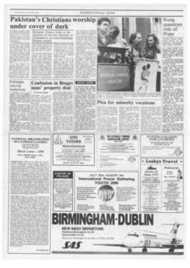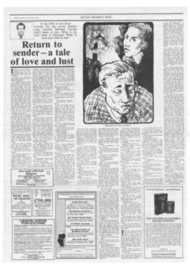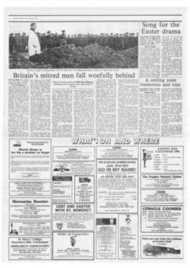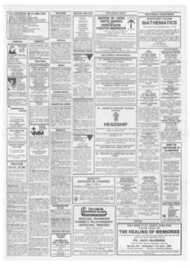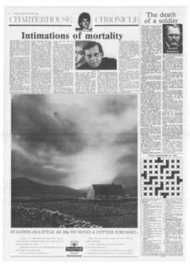Page 11, 30th March 1990
Page 11

Report an error
Noticed an error on this page?If you've noticed an error in this article please click here to report it.
Tags
Share
Related articles
Privatisation Of A King's Conviction
Grief Is Not The Hankie-mopping In Films
Fr Ronald Rolheiser The Last Word
‘i Want To Send Some Flowers To Heaven’
Secure In The Arms Of A Loving God
Intimations of mortality
INTIMATIONS of mortality come at different stages in our lives. For some they arrive early with the death of a parent or partner. Others of us are more fortunate and remain cushioned for longer. It only struck me that death was an inevitability very recently when an old college friend revealed he was dying of AIDS.
It is, of course, very selfish to think about oneself at such moments — and indeed that was not a conscious thought process. But the knowledge that one of my own peer group will not be here in a couple of years time, that his body no longer has the capacity to heal itself, has caused me to reflect at length on my own expectations of a limitless future spreading out ahead, with lots of difficult decisions, philosophical and theological questions left to be answered on another day, at another time, when I naively imagine the solution will somehow be clearer.
For author Morris West that moment of reckoning, that time when there is no 'longer a future into which to shunt uncomfortable questions, came
when he underwent open heart surgery. "It was a strange experience — the night watch before the operation. I had the last sacrament but it seemed curiously redundant. It was, of course, very proper, a piety, finishing where I began. But I felt that all between the Creator and me was settled, done. There could be no argument about it. Whatever necessary act had to be performed between me and the Creator was already done, I guess, by the simple acceptance that life is a gift, given in love. I was giving it back, saying thank you. That seemed to solve everything".
Morris West survived the operation and is now, to an untrained eye at least, in the best of health. But that experience of facing death full in the face has left him very much at peace with himself and the world. When I met him last week in London where he was publicising his latest novel, Lazarus, he described himself as having "arrived at what I believe to be a place of great peace and calm. I seek no longer after explanations of the mystery. I simply accept that hie is a
mystery and that God is a mystery."
Morris' latest novel, reviewed last week in these pages by Peter Hebblethwaite, like the novelist one who has sampled the religious life, deals with a similar sort of crisis point in one man's life — a pope facing vital heart surgery and reviewing his life and the achievement of his pontificate. It is as much a book about a journey of faith, and a deepening understanding of what it is to be one of the people of God, as it is an indictment of current trends in the Vatican's policies. It is well worth a read. (Lazarus is published by Heinemann, price £.12.95).
MORRIS West has featured in these pages in the past week or so as one of the authors of our seven deadly sins stories. Like all of his works of fiction, he would admit to there being an element of autobiography in his tale of Brother Avellino, his chosen vehicle for approaching the sin of covetousness.
The sevea stories which run until our Good Friday edition, when author Kate Saunders, named this week as one of the judges for the 1990 Booker Prize, tackles anger, will be published in the autumn in book form by the Spire imprint of Hodder and Stoughton.
This relative newcomer to the well known brand names of the publishing world aims to bring the best of modern writing inspired by the Christian faith to a wide and often secular audience. It was Spire, you may recall, who published Fr Ronald Rolheiser's first book in
this country The Restless Heart.
They too will be publishing his second, Forgotten Among the Lilies, a collection of the columns that have appeared in the Catholic Herald over the years he has been with us. The book comes out on July 19, when Fr Ron will be in London. Look out for details of a public meeting we are planning with Spire on that day so that the many readers who have expressed an interest in meeting
this inspiring Christian writer may get the chance to do so.
Involved in this gathering will, we hope, be author Delia Smith, a big fan of Fr Rolheiser's and another of the authors featured on Spire's list. The paperback of her Journey into God, serialised in the Herald when it came out in hardback last year, is available at the moment.
It's easy to assume in these days when city churches have to be locked most of the day because of the threat of break-ins that traditional respect for places of worship has died out altogether. Not quite, according to news from Rome.
There a repentant thief, Vincenzo Lopez, 27, has given back to police the keys to one of the city's most famous churchmuseums after having second thoughts about stealing two Caravaggios there.
Lopez had taken the keys from the sacrasty of Santa Maria del Popolo and had planned to take the works or art — but conscience got the better of him.
The courts have yet to judge his change of heart.
blog comments powered by Disqus



